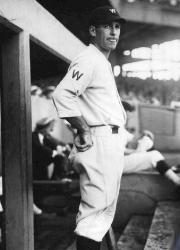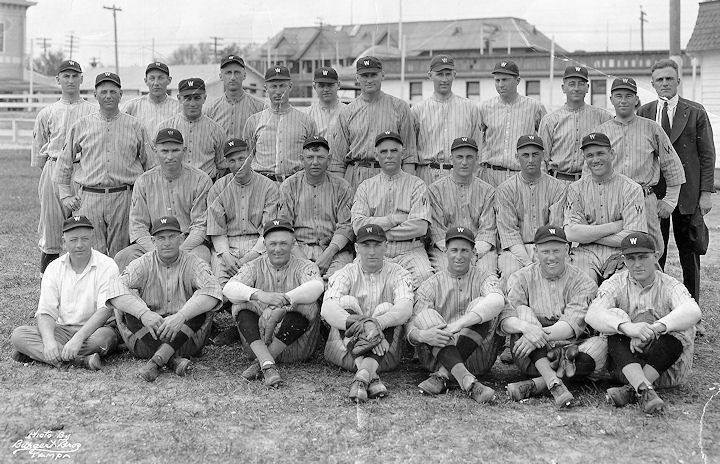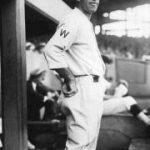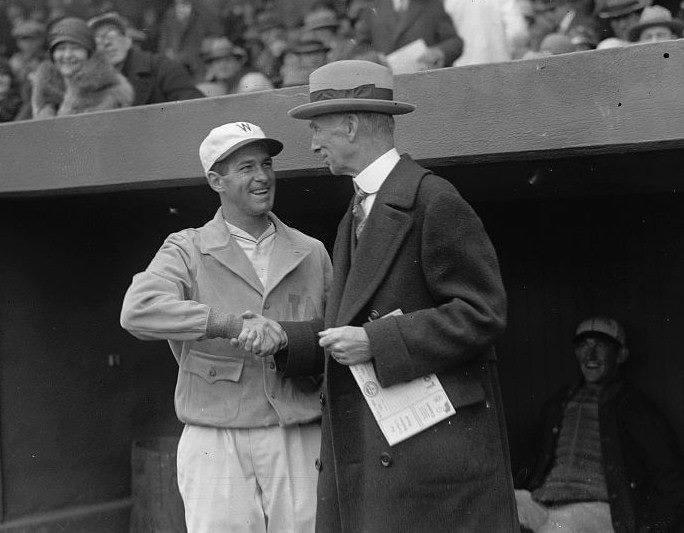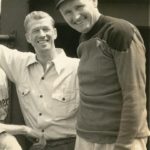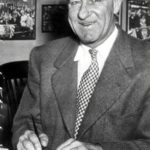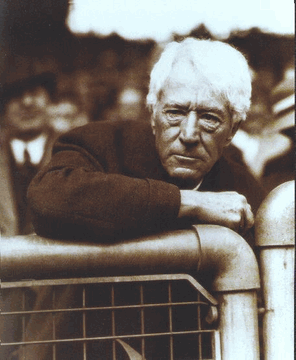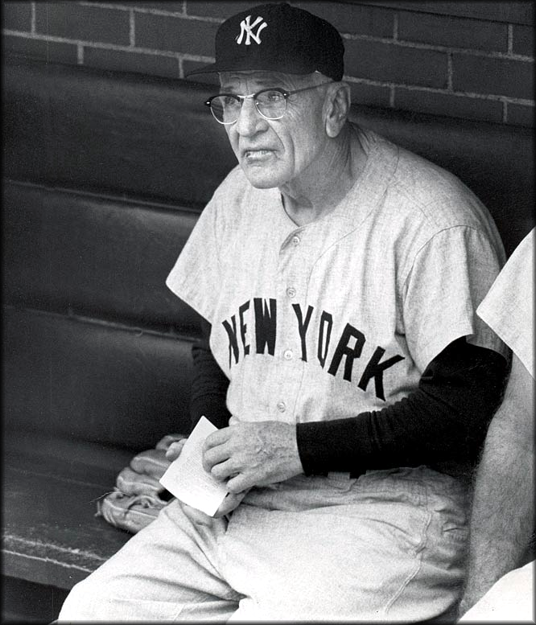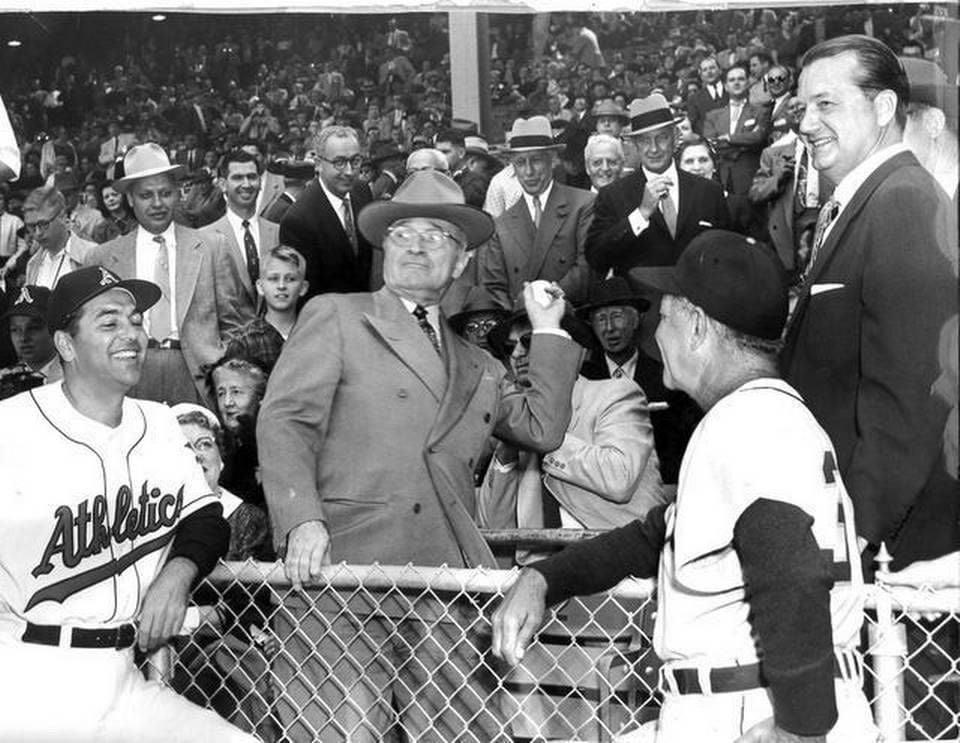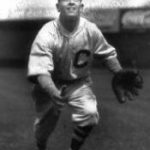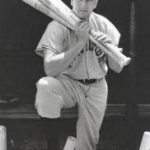Bucky Harris Stats & Facts
Bucky Harris
Position: Second Baseman
Bats: Right • Throws: Right
5-9, 156lb (175cm, 70kg)
Born: November 8, 1896 in Port Jervis, NY
Died: November 8, 1977 in Bethesda, MD
Buried: German Protestant Cemetery, Hughestown, PA
Debut: August 28, 1919 (4,783rd in major league history)
vs. NYY 5 AB, 1 H, 0 HR, 2 RBI, 0 SB
Last Game: June 12, 1931
vs. BOS 2 AB, 0 H, 0 HR, 0 RBI, 0 SB
Hall of Fame: Inducted as Manager in 1975. (Voted by Veteran’s Committee)
View Bucky Harris’s Page at the Baseball Hall of Fame (plaque, photos, videos).
Rookie Status: Exceeded rookie limits during 1920 season
Full Name: Stanley Raymond Harris
View Player Info from the B-R Bullpen
View Player Bio from the SABR BioProject
Nine Players Who Debuted in 1919
Frankie Frisch
Bucky Harris
Lefty O’Doul
George Uhle
Curt Walker
Dickie Kerr
Bernie Friberg
Chick Galloway
Virgil Barnes
All-Time Teammate Team
Coming Soon
Notable Events and Chronology
“First in war, first in peace, and last in the American League,” ran the old saw about Washington, but in 1924 the perennial AL tail-ender Senators were World Champions. In his first season at the helm was 27-year-old Bucky Harris, the youngest regular ML manager and the team’s second baseman. Washington’s rugged “Boy Manager” led by example and earned the respect of such veterans as Walter Johnson, Sam Rice, and Roger Peckinpaugh.
In the 1924 World Series against the Giants, Harris batted .333 and hit two home runs. He also set records for chances accepted, double plays, and putouts in the exciting seven-game affair. His base hit in the eighth inning of the deciding contest tied the score, and the Senators rallied in the twelfth to clinch Washington’s one and only World Championship. It was in that contest that Harris the manager won acclaim. His strategy of replacing righthanded starter Curly Ogden with lefthander George Mogridge after only two batters forced the Giants’ hard-hitting Bill Terry out of the lineup.
Harris learned baseball in the mining region of northeastern Pennsylvania. After leaving school at 13, he worked in a local colliery. Hughie Jennings, another future Hall of Famer from Harris’s home town of Pittston, arranged for the scrappy youngster’s first job in pro ball, in 1915. Harris reached the majors in 1919.
An exceptional fielder, he topped AL second basemen in putouts four times and in double plays a record five straight times (1921-25). An adequate hitter with base stealing ability, Harris had a knack for being hit by pitches. An outstanding basketball player, he played professionally with local Pennsylvania teams during the off-season, until concerned Washington officials ordered him to cease.
Under Harris, the Senators repeated as AL champs in 1925, but lost a hard-fought seven-game Series to the Pirates. After suffering his first losing season in 1928, he was traded to, and named manager of, the Tigers. Except for a few appearances at second base, Harris was a bench manager from then on. He spent five unsuccessful seasons directing the Tigers, one with the Red Sox, and then eight more with the Senators, never finishing higher than fourth. Despite the many losing campaigns, Harris was regarded as a knowledgeable manager and was extremely popular with his players. His patient, gentlemanly manner inspired such loyalty that when the Phillies fired Harris in mid-1943, his players threatened to strike.
Between ML jobs, Harris managed in the International and Pacific Coast leagues. In 1947, he led the Yankees to a World Series victory, and was named TSN Manager of the Year. He was dropped abruptly a year later after a 94-60 third-place finish. Though he managed for another seven years, Harris never again landed in the first division.
Harris also served as assistant GM of the Red Sox and scouted for the White Sox. Named a special assignment scout with the expansion Washington Senators in 1963, he finished where he had begun his ML career a half century earlier. Harris, the youngest man to lead a major league team to a World Series victory, was elected, as a manager, to the Hall of Fame in 1975 by the Veterans Committee.@ET-DC@eyJkeW5hbWljIjp0cnVlLCJjb250ZW50IjoicG9zdF90YWdzIiwic2V0dGluZ3MiOnsiYmVmb3JlIjoiTGVhcm4gTW9yZSBhYm91dCB0aGUgdGVhbXMsIHBsYXllcnMsIGJhbGwgcGFya3MgYW5kIGV2ZW50cyB0aGF0IGhhcHBlbmVkIG9uIHRoaXMgZGF0ZSBpbiBoaXN0b3J5IC0gLSAtIC0gLSAtIC0gIiwiYWZ0ZXIiOiIiLCJsaW5rX3RvX3Rlcm1fcGFnZSI6Im9uIiwic2VwYXJhdG9yIjoiIHwgIiwiY2F0ZWdvcnlfdHlwZSI6InBvc3RfdGFnIn19@
Biography
Only Connie Mack managed more games than Bucky Harris, who debuted as a 27-year-old “Boy Manager” and led the Washington Senators to their only World Championship. Harris enjoyed a solid 12-year playing career as a second baseman, highlighted by his fielding play and his clutch performance in the 1924 World Series. He had a laid-back style and was very popular with his players. When the Phillies fired him in mid-season in 1943, his players threatened to strike unless he was reinstated. The humble Harris interceded and convinced the players to back down. He ranks fourth all-time in managerial victories.
Played For
Washington Senators (1919-1928)
Detroit Tigers (1929-1931)
Managed
Washington Senators (1924-1928)
Detroit Tigers (1929-1933)
Boston Red Sox (1934)
Washington Senators (1935-1942)
Philadelphia Phillies (1943)
New York Yankees (1947-1948)
Washington Senators (1950-1954)
Detroit Tigers (1955-1956)
Similar: Buck Weaver, Bill Wambsganss, Jimmie Dykes (as a manager)
Linked: Roger Peckinpaugh
Best Season, 1924
Everything went right for Harris in 1924. He led AL second basemen in nearly every defensive category, managed the Senators to their first Ameican League pennant, and starred in the World Series. Harris hit .333 (11-for-33) with two homers (as many as he’d hit in any one season), and seven RBI. The Senators defeated the New York Giants in seven games.
Post-Season Appearances
1924 World Series
1925 World Series
Where He Played: Harris was a second baseman, playing 1,253 games at that position, primarily in the 1920s.
Feats: Harris led American League second basemen in putouts four times and in double plays a record five straight times.
Notes
Harris managed the AL All-Star team in 1948; he was named Manager of the Year by The Sporting News in 1947.
Injuries and Explanation for Missed Playing Time
As Tiger manager in 1955, Harris suffered an infected finger, which kept him from filling out his lineup cards early in the season. A Detroit sportswriter helped him fill out the cards on at least one occasion.
Transactions
Traded by Washington Senators to Detroit Tigers in exchange for Jack Warner (December 19, 1928).
Data courtesy of Restrosheet.org
His Best Team: The 1947 Yankees
Filling the void after Joe McCarthy was fired in New York, Harris took the Yankees to the World Series, where they beat the Dodgers in seven games. The Yankees led the AL in both offense and pitching, winning 97 games behind Joe DiMaggio, Tommy Henrich, Allie Reynolds, and Joe Page.
Best Strength as a Manager
Harris was famously calm as a manager. His players loved him and were extremely loyal.
Largest Weakness as a Manager
Hall of Fame second baseman Charlie Gehringer, who played for him in Detroit from 1929-1933, said, “The fact that he was so easy to play for probably didn’t help his managing.” Of course, Gehringer had begun his career under Ty Cobb and then George Moriarty — two high-strung managers, to say the least.
Best Strength as a Player
Range at second base. Harris was also very adept at getting hit by pitches.
Largest Weakness as a Player
Power, though he was hampered by playing in Griffith Stadium, which was by far the toughest park of that era to homer in.
Other Resources & Links
Coming Soon
If you would like to add a link or add information for player pages, please contact us here.

